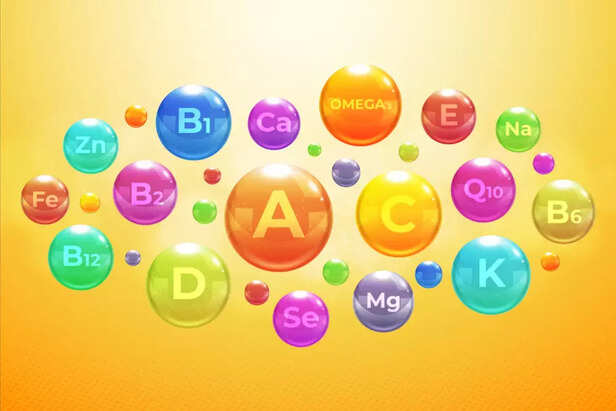Tired After Lunch? Breaking Out? Try These Essential Vitamins and Minerals to Boost Your Health
Shumaila Siddiqui | Wed, 30 Apr 2025
This article highlights the importance of essential vitamins for a healthy body and important minerals for overall health, such as Vitamin A, B12, C, D, iron, calcium, magnesium, and zinc. It focuses on the best vitamins and minerals for immune health, including selenium and Vitamin C, D, A, and zinc. It also emphasizes the need for key vitamins for body health through simple, everyday foods, while suggesting supplements only when needed for specific groups like vegans or those with limited sun exposure.

Photo:
Ever wondered why your energy crashes after lunch, your skin breaks out during stressful times, or your immunity gives up just when you need it most? The answer might lie not in your sleep or workload—but in your plate. In today’s fast-paced, snack-fueled world, it's easy to miss out on key nutrients that quietly keep us functioning at our best. These nutrients, especially vitamins and minerals, are like the backstage crew in a play—unseen but absolutely essential. From your brain to your bones, immunity to mood, these microscopic heroes help your body thrive. Let’s decode what your body truly needs—and how to get it.

Vitamins are organic compounds your body can't produce in sufficient quantities. They help your body perform vital functions, from healing wounds to converting food into energy. Each vitamin plays a unique role, and missing out on them can lead to fatigue, poor immunity, and even long-term health issues.

Minerals are inorganic elements needed for growth, development, and good health. While vitamins spark the processes, minerals support them—think of them as the structural elements of your body.
Want to dodge colds, recover faster from infections, and feel more resilient year-round? Then boosting your immune system is key—and that starts with nutrition.
Immune Boost Tip: Add citrus fruits, yogurt, garlic, green tea, and sunflower seeds to your weekly meal plan. These are loaded with natural vitamins and minerals that power up immunity.
You don’t need fancy supplements or expensive superfoods to stay healthy. What your body really craves are these core nutrients found in everyday foods.
The Must-Have List:

Here’s how to make it work without needing a nutrition degree or expensive diet plan:
Build a Colorful Plate:
10 to 15 minutes of early morning sun exposure daily can boost your Vitamin D levels naturally.

If your diet is varied and balanced, supplements may not be needed. But some people do benefit from supplements, especially:
Always consult a doctor or registered dietitian before starting a supplement regime.
We often chase fitness goals through intense workouts or trendy diets, but true health begins at the cellular level. Your body relies on a constant supply of essential vitamins and minerals to keep your brain sharp, your immunity strong, and your energy high. Think of these nutrients as fuel for your future—helping you study better, move smarter, sleep deeper, and stay resilient. And the best part? They’re not hidden in expensive health drinks or imported berries. They’re right there—in your home-cooked dal, fresh fruits, nuts, leafy greens, and yes, even in your morning glass of milk. Nourish your body with intention today, and you’ll thank yourself tomorrow.
Unlock insightful tips and inspiration on personal growth, productivity, and well-being. Stay motivated and updated with the latest at My Life XP.
Essential Vitamins for a Healthy Body

Vital Nutrients
Vitamins are organic compounds your body can't produce in sufficient quantities. They help your body perform vital functions, from healing wounds to converting food into energy. Each vitamin plays a unique role, and missing out on them can lead to fatigue, poor immunity, and even long-term health issues.
Vitamin A – For Eyes and Immunity
- What it does: Supports vision, especially night vision, and keeps skin and mucous membranes healthy.
- Found in: Carrots, spinach, sweet potatoes, mangoes, eggs, and liver.
- Fun fact: A deficiency can lead to night blindness and dry eyes.
Vitamin B12 – For Brain and Blood Health
- What it does: Maintains nerve health, supports memory and mood, and helps make red blood cells.
- Found in: Animal products like meat, dairy, fish, and fortified cereals.
- Tip: Vegans should consider B12 supplements or fortified foods to avoid fatigue or memory fog.
Vitamin C – For Skin and Immunity
- bBoosts immunity, supports collagen production (for skin), and helps absorb iron.
- Found in: Oranges, kiwi, strawberries, bell peppers, and broccoli.
- Why it matters: Smokers and people under stress may need extra Vitamin C to protect cells.
Vitamin D – The Sunshine Vitamin
- What it does: Helps your body absorb calcium, keeps bones strong, and supports mood regulation.
- Found in: Sunlight, fortified milk, mushrooms, egg yolks, and fatty fish like salmon.
- Health note: Urban lifestyles keep many indoors—leading to widespread Vitamin D deficiencies.
Important Minerals for Overall Health

Mineral Benefits
Minerals are inorganic elements needed for growth, development, and good health. While vitamins spark the processes, minerals support them—think of them as the structural elements of your body.
Iron – For Energy and Red Blood Cells
- What it does: Helps red blood cells carry oxygen, preventing fatigue and improving concentration.
- Found in: Red meat, beans, spinach, tofu, lentils, and fortified cereals.
- Did you know? Iron deficiency is one of the most common nutritional deficiencies, especially in women.
Calcium – For Strong Bones and Teeth
- What it does: Builds bone mass, supports muscle function, and keeps the heart rhythm steady.
- Found in: Dairy products, almonds, broccoli, fortified soy milk, and tofu.
- Pro tip: Calcium absorption improves when taken with Vitamin D—teamwork matters.
Magnesium – The Calm Mineral
- What it does: Helps with muscle relaxation, nerve function, and sleep quality.
- Found in: Nuts, seeds, whole grains, spinach, and dark chocolate.
- Why it’s cool: Magnesium is great for reducing anxiety and preventing muscle cramps.
Zinc – For Healing and Immunity
- What it does: Supports the immune system, aids wound healing, and helps with taste and smell.
- Found in: Pumpkin seeds, shellfish, legumes, and meat.
- Health tip: Zinc deficiency can weaken your immune defense and slow recovery from infections.
Best Vitamins and Minerals for Immune Health
Top Immunity-Boosting Nutrients:
- Vitamin C: Protects immune cells, shortens the duration of colds.
- Vitamin D: Modulates immune response; reduces risk of respiratory infections.
- Zinc: Enhances white blood cell function; fights off bacteria and viruses.
- Iron: Supports oxygen transport; key to building immune-strengthening blood cells.
- Selenium: An antioxidant that lowers inflammation and boosts immunity.
- Vitamin A: Protects respiratory and gut linings, your body’s first barrier against pathogens.
Key Vitamins for Body Health
The Must-Have List:
- Vitamin D: For mood balance, hormone regulation, and calcium absorption.
- Vitamin B12: To prevent anemia, support nerve function, and maintain energy levels.
- Vitamin C: For glowing skin, fast recovery, and strong immunity.
- Magnesium: For deep sleep, muscle recovery, and heart health.
- Iron: For cognitive function and stamina.
- Calcium: To prevent fractures, especially as you age.
- Zinc: To prevent frequent illness and promote
skin health .
Easy Ways to Add These Nutrients to Your Diet

Diet Tips
Here’s how to make it work without needing a nutrition degree or expensive diet plan:
Build a Colorful Plate:
- Include leafy greens (iron, calcium, magnesium)
- Add orange veggies like carrots and sweet potatoes (vitamin A)
- Toss in bell peppers and berries (vitamin C)
Start Your Day Right:
- Fortified breakfast cereals (B12, iron)
- Yogurt with seeds (calcium, magnesium, zinc)
- A boiled egg or almond butter toast (protein and vitamin D)
Think Whole Foods:
- Whole grains (magnesium, selenium)
- Legumes (iron, zinc)
- Lean meats or tofu (B12, iron, zinc)
Don’t Fear the Sun:
Are Supplements Necessary?

Supplements Guide
If your diet is varied and balanced, supplements may not be needed. But some people do benefit from supplements, especially:
- Vegans: May need B12, iron, and omega-3.
- Women of childbearing age: Often need iron and folate.
- People with limited sun exposure: Likely need Vitamin D.
- Athletes: Might benefit from magnesium, B-vitamins, and zinc.
We often chase fitness goals through intense workouts or trendy diets, but true health begins at the cellular level. Your body relies on a constant supply of essential vitamins and minerals to keep your brain sharp, your immunity strong, and your energy high. Think of these nutrients as fuel for your future—helping you study better, move smarter, sleep deeper, and stay resilient. And the best part? They’re not hidden in expensive health drinks or imported berries. They’re right there—in your home-cooked dal, fresh fruits, nuts, leafy greens, and yes, even in your morning glass of milk. Nourish your body with intention today, and you’ll thank yourself tomorrow.
Unlock insightful tips and inspiration on personal growth, productivity, and well-being. Stay motivated and updated with the latest at My Life XP.
Frequently Asked Question (FAQs)
- What are essential vitamins and minerals the body needs?
Essential vitamins and minerals include Vitamin A, B12, C, D, E, Iron, Calcium, Magnesium, Zinc, and Potassium. - What vitamins and minerals do you need for healthy skin?
For healthy skin, you need Vitamin C, Vitamin E, Zinc, and Omega-3 fatty acids. - What are the 12 essential vitamins for humans?
The 12 essential vitamins for humans are Vitamin A, B1 (Thiamine), B2 (Riboflavin), B3 (Niacin), B5 (Pantothenic acid), B6, B7 (Biotin), B9 (Folate), B12, Vitamin C, Vitamin D, and Vitamin E.










